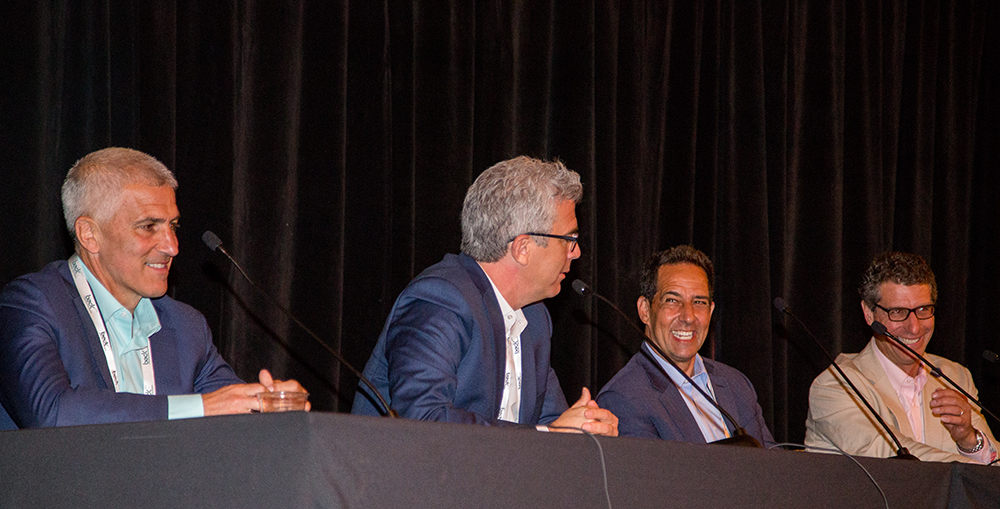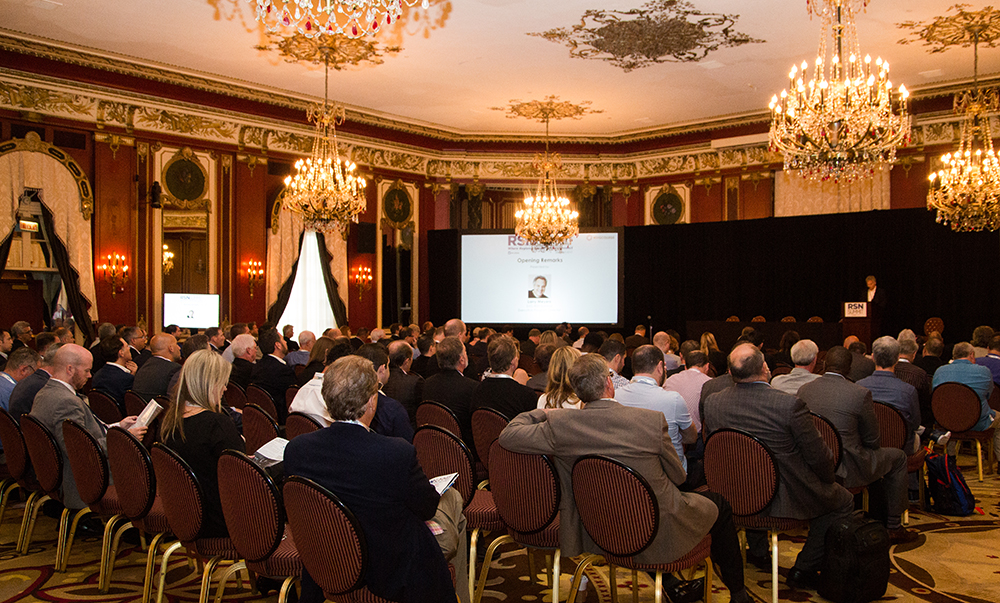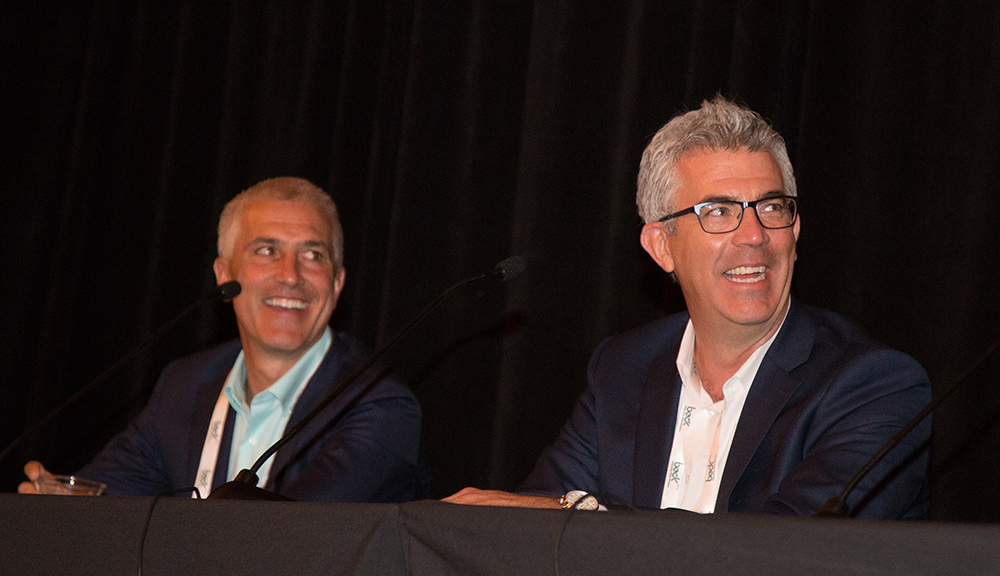SVG’s Second-Annual RSN Summit Brings Together Regional Sports Leaders From Coast to Coast
The RSN Summit drew a record crowd of more than 275, including execs from every major RSN organization.
Story Highlights
SVG’s second-annual RSN Summit brought together more than 275 top executives from regional sports networks and technology vendors at the historic Palmer House Hilton in Chicago on June 27-28 to address the unique production and business challenges facing RSNs today. The event, which featured an expanded program and record-high attendance for the Opening Night Reception, kicked off on Tuesday with a trio of sessions focused on the State of the RSN Market, comprised of a pair of in-depth presentations focused on Ratings and Viewership and Rights and Opportunities, followed by a star-studded panel discussion.
Day 2 featured a full day of sessions, including GM and EP Perspectives; League and Team Perspectives; How New Technology Is Changing the Way We Tell the Story, How OTT, Mobile, Social Are Parts of the ‘New Normal’; Ad Sales and Promos Within Content; and Making Original Programming Work in the Studio and Behind the Scenes. In addition the Wednesday program featured a pair of workshops: The Facebook Live Bootcamp and the Technology and Operations Workshop (covering Best Practices in Operations, 4K and HDR production, and At-Home Production).
The program for this year’s event was spearheaded by RSN veteran Larry Meyers and the SVG RSN Advisory Committee. The RSN Summit was made possible by Title Sponsor Program Productions; Diamond Sponsor TokBox; Gold Sponsors Calrec/DiGiCo, Canon, Comrex, Imagine Communications, Quantum, SMT, Sony, and Vizrt; and Event Sponsors BeckTV, Lawo, LTN Global Communications, Mobile TV Group, The Switch, and Thinklogical.
Nielsen Sports Commercial Managing Director of Americas Stephen Master and Bevilacqua Helfant Ventures (BHV) Co-Founder Chris Bevilacqua presented the latest information and analysis in respect to RSN ratings/viewership and media rights deals, respectively. Both presentations will be available on staging.sportsvideo.org in the coming days.
Master and Bevilacqua then joined Fox Sports Regional Networks SVP/EP Michael Connelly and NBC Sports Regional Networks’ President/Group Leader and Strategic Production and Programming Ted Griggs for a wide-ranging Executive Roundtable panel that addressed the health of the RSN industry, as well as potential challenges and opportunities ahead for regional sports rightsholders.
“The RSN business is very strong right now,” said Connelly. “RSNs in each market are not just highly rated; they are, in many cases, the No. 1 TV station in their market. And I think that is often overlooked in our business. The value of that is so great and I don’t think we talk about that enough.”
Griggs echoed Connelly’s sentiments, saying in reference to Master and Bevilacqua’s preceding presentations: “After seeing the presentations today, I’m even more bullish on [the future of] RSNs. We are often the most important programming during the times we put our games on. We are part of the fabric of the community as much as the opera or the ballet. Sports teams are a huge part of a community’s culture and often connective tissue in the community. Each and every night, we bring that culture to the audience.”
A Changing Business Model and The Potential of OTT
Since the RSN business is heavily dependent upon subscriber feeds, the growing cord-cutting trend represents a major threat to how they operate. However, Griggs argued that the passion that Americans have for their local sports teams represents an integral arrow in the RSN quiver as they navigate a changing media landscape in the coming years.

From left: Chris Bevilacqua, Bevilacqua Helfant Ventures (BHV); Michael Connelly, Fox Sports Regional Networks; Ted Griggs, NBC Sports Regional Networks; and Stephen Master, Nielsen Sports
“There is no question the business is changing,” said Griggs. “It’s going make us have to be smarter and tougher. But the one thing we have that other entertainment programs don’t have is passion. When people watch sports, they lean in and are emotionally engaged for three and a half hours. You don’t get that with Desperate Housewives.”
The potential direct-to-consumer OTT regional sports services also entered the discussion, as Washington Wizards and Capitals owner Ted Leonsis launched the DC-based Monumental Sports Network last fall and L.A. Clippers owner Steve Ballmer held back some of the team’s digital rights in its most recent deal with Fox in order to build a DTC OTT offering in the near future.
“You’ve got to fish where the fish are. It’s still early in the game [in terms of digital rights deals], but as an RSN owner I think you want your programming [to be available] wherever you can get it,” said Bevilacqua. “The biggest issue [with launching a DTC OTT product] for the RSN business specifically is, if I’m a YES customer and I’m a Yankees fan, I’m going sign up for six months and then I’m going to cut it off for the Nets. How do they get around that?”
The Power of Social on the Regional Level
Much of the discussion on the panel revolved around the power of regional sports on social media platforms and how Twitter and Facebook can fuel viewership for live sports.
“Sports is inherently social,” said Master. “We measure social media activity as it relates to television by tracking every Tweet or Facebook post that relates to linear TV. Sports only accounts for about 1.5% of the total program titles on television across the 500-channel universe. Yet 50% of all tweets around television are about sports. If something exciting is happening in a game, you want to share that with your friends because you know they are all watching it live. So, social media and sports on TV are very complimentary.”
However, the ability to monetize this intense social-media engagement has remained elusive for live-sports sports rightsholders thus far. Bevilacqua sees the power of social in engaging fans but believes new rights deals in the coming years will open up new revenue streams to capitalize on these social interactions.
“Social media is great for engagement for live sports and RSNs in particular, but the challenge is going to be how do you monetize all that engagement?” he said. “I could see a day where you’re on Facebook and you see [Cubs pitcher Jake] Arrieta is throwing a no-hitter in the seventh inning of a Cubs/Cards game. You get an alert in your Facebook feed to click here to watch the game. If you’re an authenticated [MVPD] subscriber, you can watch the game right there and if not, you can click here and it’s $3.99 to watch the game. That can’t happen in today’s contractual market, but when you start imagining the opportunities moving forward, that makes it much more consumer friendly.”
Focus on the Next Generation
On the production side of the conversation, Connelly bemoaned the RSN community’s tendency to focus on their team’s aging big-name stars rather than the exciting young players moving up the ranks.
“We tend to focus on the old-timers,” said Connelly. “We have to get out of that and focus more on younger players. If you don’t hook a kid to your sport by the time he or she is 10, you might lose them and never get them back. We need to get away from telling the stories of yesterday. In the MLB All-Star game last year, we had 26 players that were 26 or younger, yet we end up talking about the old-timers. Let’s give relevance to the young fan so there is association and you will grab those young fans and the ratings will follow.”


